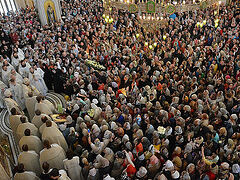Why don't people hear each other? How can you teach yourself to be more attentive to others? Is there any point in long-winded discussions? Bishop Pachomy of Pokrovsk and Novouzensk of the Russian Orthodox Church answers.
 Bishop Pachomy of Pokrovsk and Novouzensk —Vladyka, some schoolchildren came to our cathedral for a tour a while ago. I was struck by two things in their behavior: how many questions they asked and how little they managed to hear. They asked very insistently, but either didn’t listen to my answers at all or soon forgot them.
Bishop Pachomy of Pokrovsk and Novouzensk —Vladyka, some schoolchildren came to our cathedral for a tour a while ago. I was struck by two things in their behavior: how many questions they asked and how little they managed to hear. They asked very insistently, but either didn’t listen to my answers at all or soon forgot them.
—These children were being exposted to a completely unknown life, hence such a barrage of questions. Of course, children tend to ask a lot of questions in such a situation, and sometimes the process of asking is more important than the answers.
—But we can see something similar in all sorts of adult talk shows, when people seem to ask questions, but no one listens to the answers. They talk a lot and all at once...
—When more than two people take part in a discussion, it threatens to turn into an uproar. So it’s not clear at all why five to ten experts are invited to the studio. Plus shouting from the audience. All this very quickly turns into a wild farce, where whoever screams louder drowns out the people he doesn’t want to listen to. The Acts of the Apostles wonderfully describes the rebellion in Ephesus against the Christians: Some therefore cried one thing, and some another: for the assembly was confused: and the more part knew not wherefore they were come together (Acts 19:32). That’s pretty similar, isn’t it?
—Do you think the inability to hear another person is a sign of our times?
—I think this problem has always existed, but it’s on a large scale now. Our world has changed—it has less substance and more noise. Today, many psychologists and parents say that modern children don’t know how to hear. In many families the TV is constantly on in the background, because it’s difficult for people to remain in silence, because then you’re at the least alone with yourself, and at most alone with God.
Children hear the TV from infancy. Many teachers say they can’t reach the child. He perceives words, even spoken in raised tones, as a kind of norm and can’t concentrate on them. What should be done here? It's hard to give a ready-made recipe. Much depends on parents, teachers, and schools, and the ability to hear children's questions and to guide a conversation in the right direction.
For example, who’s a good journalist? Not someone who works with half-truths, who hears only what he wants to hear. A serious journalist is able to develop a deep dialogue with the interlocutor, to see interesting aspects of his life experience.
—Are adults better listeners than children?
—All childhood weaknesses and sins take root even more with age unless a man does some serious work on his mistakes. What’s the advantage of the practice of regular confession, of a sober life? A man acquires the skill of self-control and compares himself with the Gospel ideal. He’s more likely to hear his neighbor. The general level of a man’s upbringing is very important.
—During the Divine services, we ask God for the ability to hear the Gospel. That is, is it possible to stand in church without any hearing problems and at the same time not hear what the Lord tells us in the Holy Scriptures?
—We ask the Lord not only for the opportunity to hear what the priest reads, but to understand it. Because, as we read in the Gospel, Christ often told the people, the Pharisees: …because they seeing see not; and hearing they hear not, neither do they understand (Mt. 13:13). I’ve often met people who said: “I’ve read and heard the Gospel, but I can’t understand it at all.” It’s always seemed very strange to me. After all, when we read ordinary books, we might not catch the subtle meanings and the details, but we can’t say we didn’t understand anything!
—How come, even when we listen to the other person attentively, we don’t hear what he really wants to say?
—I think a man who doubts his rightness has a better chance of hearing the other person. But the man who doesn’t doubt his own rightness—nothing can move him or break through to him. As a rule, such people make serious mistakes, because they can’t look at what’s happening from the outside. Talking with your spiritual father can help here. It’s very important when children listen to their parents’ opinion, when the student is ready to hear his teacher.
There’s a wonderful rule of army life: Having received an order, a soldier has to repeat it. After all, what you heard and what you understood can be diametrically opposed. If a soldier or officer misunderstood an order, the consequences can be terrible—not only for himself, but for many others.
I think it’s very important to hear each other in everyday life. If people are close, certain relationships develop between them, and they already know each other, so understanding is easier to achieve. But it can be difficult with strangers, of course.
But there’s one more thing: Not everyone should be listened to and obeyed. A big problem today is the manipulation of consciousness, for example, by the media. I think that a deep, serious faith in God and, as they say in our monastic environment, distrust of oneself, doubt in one’s thoughts, is a system of protection against manipulation.
—The desire to speak out often prevents us from hearing another. As Metropolitan Athanasios of Limassol said in one of his talks: “We’re accustomed only to talking. The art of listening is unknown to us.” How can you train yourself to listen carefully and with interest to others?
—The Apostle James writes in his epistle: My brethren, be not many masters, knowing that we shall receive the greater condemnation (Jas. 3:1). Don’t always try to talk and teach. It’s always better to be a disciple. Sometimes it seems to us that after finishing school we stop being students. But we have to have a mentor in our lives—someone whose opinion we need to heed. In the highest sense, this is God, of course. We must evaluate our actions, what’s happening around us, from the perspective of the Gospel. And on down the line—the authority of the priest, husband, father... If a man doesn’t recognize any authority over himself, I think a difficult future awaits him. But if he learns to listen, this skill can save him from some mistakes.
Can a man, in principle, train himself to listen and hear others? I think of course he can if he strives for it, if he even suspects that he has a problem with it.
—People often complain that they aren’t heard by their loved ones—parents, spouses and children. Why does this happen and what can we do about it?
—Loved ones are so used to each other and know each other so well that it can be very difficult to destroy mutual affection or dislike. We have to pray, because God can do what men can’t. If we can’t or don’t know how to get through to someone, we have to ask the Lord to translate from our ordinary language into the language of this person’s heart.
It often happens that two people are talking and don’t understand each other at all. It’s imperative that a third person intervenes. This third person can be a priest. For example, if spouses go to the same priest for confession, then they’re immune to difficulties and problems to some extent, because they trust the man who translates for them, helping them hear each other.
—In a monastery, a man who is preparing to be tonsured is called a novice.1 What does this word mean?
—A novice is a full-fledged member of a monastery who performs certain tasks that subdue his pride. He gets used to the lifestyle of the monastery and draws conclusions about whether he should stay in a monastery and take vows there. But don’t think that after his tonsure a monk is freed from obedience.2
—Many believe that novices are voluntary slaves who have one job—to endure all humiliations patiently. Is this true?
—Certainly not. In fact, by cutting off his will, a man receives great inner freedom. After all, any man is quite limited by many internal and external factors. And a novice cuts off his will through the will of other people. It can be very difficult at the first stage of life in a monastery because sometimes for spiritual perfection it’s necessary not only to abandon your sins and passions, but also your loftiest intentions, because it’s clear to others that fulfilling them won’t bear any good fruit. The logic of monastic life is totally incomprehensible to many secular people who are accustomed to listening to and obeying only themselves.
—How do you remember the time when you were a novice at the Moscow dependency of the Holy Trinity-St. Sergius Lavra?
—I was always very happy and I had a feeling of amazing lightness. Of course, that doesn’t mean I didn’t want to sleep, didn’t get tired, and didn’t have sorrows. I just felt this inner freedom. For a bishop, of course, everything is different. You yourself have to give advice and blessings to many, and this is always very difficult. Being the boss is really hard, if you approach it right, of course. That’s why we pray for the Patriarch, for the bishops, for the civil authorities. It‘s very difficult for them.



